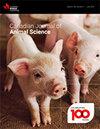甲基磺酰甲烷(MSM)对脂多糖(LPS)诱导的猪肠上皮细胞(IPEC-J2)屏障功能损伤的保护作用
IF 1
4区 农林科学
Q3 AGRICULTURE, DAIRY & ANIMAL SCIENCE
引用次数: 0
摘要
摘要甲基磺酰基甲烷(MSM)是一种具有抗炎和抗氧化特性的天然有机硫成分。本研究采用猪肠上皮细胞(IPEC-J2)损伤模型,探讨MSM对脂多糖(LPS)诱导的猪肠上皮屏障损伤的影响。细胞周期结果显示,添加300 mmol/L MSM后,G2/M期细胞数量显著减少(P < 0.05)。ELISA检测结果显示,MSM能显著抑制肿瘤坏死因子- α、白细胞介素-1、白细胞介素-6的表达(P < 0.01)。MSM能显著提高IPEC-J2细胞单层上皮电阻值,降低fitc -葡聚糖通量通透性和乳酸脱氢酶活性(P < 0.01)。300 mmol/L MSM显著提高了occludin、claudin-1和ZO-1 mRNA和蛋白的表达(P < 0.05)。此外,MSM可以阻止LPS对表皮生长因子受体(EGFR)的下调,表明MSM可能通过激活EGFR介导的蛋白合成机制增强IPEC-J2细胞的紧密连接功能。因此,我们的研究结果表明,MSM对lps诱导的IPEC-J2细胞的炎症和上皮屏障损伤具有保护作用,这表明MSM可能是一种潜在的养猪业治疗剂。本文章由计算机程序翻译,如有差异,请以英文原文为准。
Protective effects of methylsulfonylmethane (MSM) on barrier function injury of porcine intestinal epithelial cells (IPEC-J2) induced by lipopolysaccharide (LPS)
Abstract Methylsulfonylmethane (MSM) is a natural organic sulfur component that has anti-inflammatory and antioxidant properties. In this study, injury of porcine intestinal epithelial cell (IPEC-J2) models were used to investigate the effect of MSM on lipopolysaccharide (LPS)-induced porcine intestinal epithelium barrier damage. The results of the cell cycle showed that the cells in the G2/M phase decreased significantly with the supplementation of 300 mmol/L MSM (P < 0.05). The ELISA assay revealed that MSM could significantly inhibit the expression of tumor necrosis factor-alpha, interleukin-1, and interleukin-6 (P < 0.01). Meanwhile, MSM could significantly increase the value of cell monolayer transepithelial electrical resistance while reducing the FITC-dextran flux permeability and lactate dehydrogenase activity in IPEC-J2 cells (P < 0.01). Additionally, 300 mmol/L MSM significantly increased both mRNA and protein expression of occludin, claudin-1, and ZO-1 (P < 0.05). Furthermore, MSM prevented the downregulation of epidermal growth factor receptor (EGFR) by LPS, indicating that MSM might enhance tight junction function through mechanisms of activation of EGFR-mediated protein synthesis in IPEC-J2 cells. Therefore, our findings suggested that MSM has protective effects on inflammation and epithelial barrier injury in LPS-induced IPEC-J2 cells, indicating that MSM might be used as a potential therapeutic agent in the pig industry.
求助全文
通过发布文献求助,成功后即可免费获取论文全文。
去求助
来源期刊

Canadian Journal of Animal Science
农林科学-奶制品与动物科学
CiteScore
2.30
自引率
0.00%
发文量
51
审稿时长
6 months
期刊介绍:
Published since 1957, this quarterly journal contains new research on all aspects of animal agriculture and animal products, including breeding and genetics; cellular and molecular biology; growth and development; meat science; modelling animal systems; physiology and endocrinology; ruminant nutrition; non-ruminant nutrition; and welfare, behaviour, and management. It also publishes reviews, letters to the editor, abstracts of technical papers presented at the annual meeting of the Canadian Society of Animal Science, and occasionally conference proceedings.
 求助内容:
求助内容: 应助结果提醒方式:
应助结果提醒方式:


